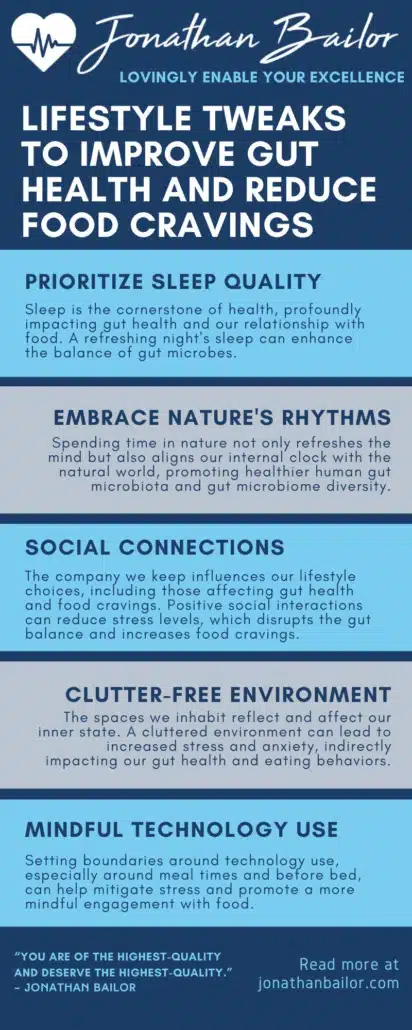18 Easy Ways to Improve Gut Health While Decreasing Food Cravings
Navigating the intricate landscape of our health can sometimes feel like solving a complex puzzle. Especially as we age, maintaining balance becomes paramount, with gut health and managing food cravings taking center stage. What if there were simple, straightforward strategies to harmonize our digestive health and curb those untimely cravings? Explore these solutions and more in this Hormone Health Guide with Jonathan Bailor.
Understanding the crucial link between a healthy gut microbiome and food cravings opens a gateway to improved well-being. The gut, often called our “second brain,” influences much more than digestion. It plays a pivotal role in our overall health, mood, and even the types of foods we crave. When our gut bacteria are out of balance, we might find ourselves craving sugary or unhealthy foods more often.
But here’s the good news: There are easy and effective ways to support a healthy gut and, in turn, naturally reduce those cravings. This article isn’t just about cutting out foods or restrictive diets; it’s about adding more joy, health, and balance to your life. By embracing these strategies, you can look forward to nurturing your body, soothing your cravings, and embarking on a journey toward optimal health.
Stay tuned as we explore practical steps to bolster your gut health and make peace with food. Remember, the path to a healthier you is not about deprivation; it’s about empowerment, understanding, and making choices that support your body and your goals. So, let’s get ready to transform our approach to health, one step at a time.
Harmonizing Gut Health and Food Cravings Through Lifestyle Enrichment
Embracing a holistic approach to health transcends the boundaries of diet, activity, and mental/spiritual practices. It invites us to examine the broader spectrum of our daily routines and habits, seeking opportunities for positive shifts that ripple through our overall well-being. This journey into lifestyle adjustments offers a refreshing perspective on managing gut health and food cravings, focusing on elements that often go unnoticed yet hold the power to transform.
Let’s explore these lifestyle changes, each a stepping stone to a more balanced and health-fulfilling life.
1. Prioritize Sleep Quality
Sleep is the cornerstone of health, profoundly impacting gut health and our relationship with food. A refreshing night’s sleep can enhance the balance of gut microbes, which is crucial for the digestive system and absorption. Conversely, disrupted sleep patterns can lead to imbalances, manifesting as increased cravings for unhealthy foods. It can even lead to mental health disorders.
By creating a sleep-conducive environment, free from electronic distractions, and establishing a regular bedtime routine, you can significantly improve your gut health and reduce cravings, fostering a cycle of rejuvenation and balance.
2. Embrace Nature’s Rhythms
Spending time in nature not only refreshes the mind but also aligns our internal clock with the natural world, promoting healthier human gut microbiota and gut microbiome diversity. Sunlight exposure, particularly in the morning, can regulate circadian rhythms, impacting our eating patterns and hormonal balance. This synchronicity can diminish untimely food cravings and support digestive health.
Integrating daily walks outside or moments to bask in the sunlight can be a simple yet powerful tool for well-being.
3. Cultivate Social Connections
The company we keep influences our lifestyle choices, including those affecting gut health and food cravings. Positive social interactions can reduce stress levels, which disrupts the gut balance and increases cravings for comfort foods.
By nurturing supportive relationships and participating in community activities, we create an environment that promotes well-being and makes it easier to adopt healthier lifestyle habits.
4. Foster a Clutter-Free Environment
The spaces we inhabit reflect and affect our inner state. A cluttered environment can lead to increased stress and anxiety, indirectly impacting our gut health and eating behaviors. Taking steps to organize and declutter your living space and workspaces can create a sense of calm and order, reducing stress and its adverse effects on the gut.
This serene environment encourages better lifestyle choices, naturally curbing the inclination towards unhealthy foods.
5. Adopt Mindful Technology Use
In the digital age, constant connectivity can become a source of stress, affecting our gut health and exacerbating food cravings. Setting boundaries around technology use, especially around meal times and before bed, can help mitigate stress and promote a more mindful engagement with food.
By consciously choosing when and how to engage with digital devices, we can foster a healthier balance in our lives, supporting both our mental well-being and our gut health.
Embracing these lifestyle changes offers a path to enhancing our well-being, harmonizing gut health, and managing food cravings with grace and ease. Though simple, each adjustment is profound in its impact, weaving together a tapestry of health that supports us holistically.
Integrating these practices into our daily lives leads to a more balanced, healthy, and vibrant existence.

Feeling Better Is Priceless, That's Why We Don't Put A Price On It!
“It’s Like A Free and Medically Valid Version of Noom and Weight Watchers Online”
~ Dr. Doctor Matthew Oleshiak, MD
Click the 'LEARN MORE' button below for free lifetime access to the fast fix program developed by Jonathan and top Ivy League Medical Doctors
LEARN MOREP.S. It's not a free trial. It's not part of the program for free. The entire program is free, forever, for real! No credit card needed.
Nourishing the Gut: Dietary Adjustments for Enhanced Well-being
The foods we consume are pivotal in sculpting our health, particularly the intricate ecosystem within our gut. Research shows that a steady diet of ultra-processed foods can lead to gut dysbiosis and poor gut health. As we aim to harmonize gut health and reduce food cravings, focusing on dietary adjustments opens a realm of possibilities for nurturing well-being. By carefully selecting ingredients that support gut flora and stabilize our cravings, we embark on a journey of discovery, where each meal brings us closer to our health goals.
Let’s explore the dietary changes that can transform our relationship with food and foster a thriving gut environment.
1. Amplify Fiber Intake with Vegetables and Fruits
Incorporating a diverse range of vegetables and fruits into our diet enriches the gut with essential fibers, acting as prebiotics that stimulate the growth of beneficial bacteria. These fibrous foods not only support digestion but also contribute to a feeling of fullness, naturally diminishing the urge for less nutritious snacks. They also feed essential anti-inflammatory gut bacteria, helping to reduce gut and systemic inflammation.
Opt for a colorful variety of nonstarchy vegetables and low-sugar fruits to ensure a broad spectrum of nutrients and prebiotics. This will make each meal a feast for the eyes and a foundation for gut health.
2. Introduce Fermented Foods for Probiotic Power
Fermented foods are a treasure trove of probiotics, the beneficial bacteria that inhabit our gut and influence everything from digestion to mood regulation. By integrating foods like yogurt (without added sugars), kefir, sauerkraut, and kimchi into our daily diet, we directly supply our gut with these life-supporting microbes.
This not only helps maintain a balanced gut flora but can also help curb cravings by improving the gut-brain connection.
3. Embrace Healthy Fats for Satiety and Flora Support
Incorporating sources of healthy fats, such as avocados, nuts, seeds, and olive oil, into our diet offers a dual benefit. These fats promote a sense of satiety, reducing the impulse to reach for sugary snacks, and they support the health of the gut lining. Healthy fats can also aid in absorbing fat-soluble vitamins, further enhancing nutritional intake and overall well-being.
Making these fats a staple in our meals ensures that each dish contributes to our health and satisfaction.
4. Choose Lean Proteins to Nurture Gut and Curb Cravings
Lean protein sources, including legumes, fish, and poultry, serve as essential building blocks for our body, including the gut. These proteins can help repair and maintain the gut lining, support the growth of beneficial bacteria, and, by their very nature, help manage hunger and reduce cravings.
Integrating lean proteins into meals and snacks ensures steady energy levels and supports gut health, aligning our dietary habits with wellness objectives.
5. Stay Hydrated with Water and Herbal Teas
Proper hydration is crucial for maintaining optimal gut health and aiding in digestion. Drinking ample water throughout the day, along with herbal teas, can support the gut’s ability to process foods and absorb nutrients effectively. Additionally, staying hydrated can help distinguish between true hunger and thirst, often misinterpreted as food cravings.
Embrace water and herbal teas as your primary beverages to support your dietary efforts and enhance overall health.
By adopting these dietary strategies, we nurture our gut with every bite, creating a harmonious internal environment that supports our health and well-being. Each of these changes is a step towards a more balanced, nutritious diet that not only caters to our gut health but also aligns with our aspirations for a vibrant, healthy life.

Cultivating Vitality: Physical Activities for Gut Health and Balanced Cravings
In nurturing our bodies, physical activity emerges as a powerful ally, transcending its role beyond mere exercise. It beckons us to a dance of movement that harmonizes gut health and stabilizes food cravings, laying a foundation for vibrant well-being. As we embark on this journey, it’s essential to view physical activity not as a task but as an invitation to enhance the quality of our lives.
Let’s explore a series of physical activities that, when woven into the fabric of our daily lives, can transform our relationship with our bodies and foster an environment of health and balance.
1. Gentle Yoga for Digestive Harmony
Yoga, emphasizing mindful movement and breathing, offers a gentle yet effective way to stimulate digestion and promote gut health. Through specific poses that massage the abdominal organs, yoga encourages digestive efficiency and helps alleviate discomfort associated with bloating and gas.
Incorporating a regular yoga practice into your routine can also reduce stress, further contributing to a balanced gut flora and reducing the likelihood of stress-induced cravings.
2. Brisk Walking to Boost Gut Mobility
Brisk walking, a simple yet profoundly beneficial activity, can significantly impact gut health and appetite regulation. This low-impact exercise stimulates the muscles in the gastrointestinal tract, promoting regular bowel movements and enhancing overall digestive function.
Regular brisk walks, especially after meals, can also help regulate blood sugar levels, preventing spikes and crashes that often lead to cravings for sugary or unhealthy foods.
3. Strength Training for Metabolic Balance
Engaging in strength training exercises a few times a week can improve muscle mass, which in turn enhances metabolic health. A robust metabolism supports efficient digestion and nutrient absorption, key components of gut health.
Moreover, strength training has been shown to positively affect hormones related to hunger and satiety, helping to curb excessive food cravings and encouraging more balanced eating habits.
4. Swimming for Stress Relief and Digestive Support
Swimming presents a unique combination of cardiovascular exercise and relaxation, making it an excellent choice for those looking to support their gut health. The rhythmic nature of swimming and the soothing qualities of being in water can reduce stress levels, a known factor that can disrupt gut health and fuel cravings.
Additionally, the gentle pressure of water against the abdomen during swimming can aid in stimulating digestion, offering a soothing workout for both the mind and the body. Reducing stress in this way can also relieve symptoms of irritable bowel syndrome (IBS) and inflammatory bowel disease (IBD).
Embracing these physical activities as part of our daily or weekly routines invites a symphony of benefits for our gut health and well-being. Each form of movement offers a unique blend of stimulation, support, and balance for our digestive systems, paving the way for a life of vitality and harmony.
As we engage in these activities, we celebrate our bodies’ capabilities and honor our commitment to nurturing our health from the inside out.

Nurturing Inner Balance: Mental and Spiritual Practices for Gut Health and Craving Control
Embarking on a journey toward enhanced well-being requires a holistic approach that embraces not only the physical but also the mental and spiritual dimensions of our lives. The interconnection between our inner landscape and our physical health, including the ecosystem of our gut and the nature of our cravings, is profound and undeniable. Cultivating mental and spiritual harmony can significantly improve how we relate to our bodies and our approach to food.
Let’s explore a series of mental and spiritual practices designed to enrich our inner world, fostering a healthier gut and balanced cravings while nurturing our overall sense of peace and well-being.
1. Meditation for Mind-Gut Harmony
Meditation offers a serene path to aligning our mental and emotional states, directly impacting our gut health. By reducing stress and anxiety, which are known contributors to gut imbalances and disruptive eating patterns, meditation encourages a state of calm throughout our body. Regular practice can help us become more attuned to our body’s signals, including hunger and satiety cues, allowing us to make more mindful choices about food.
Embracing meditation as part of our daily routine creates a space for self-awareness and inner balance, which is essential for holistic health.
2. Gratitude Journaling to Enhance Well-being
Expressing gratitude through journaling can transform our mental state, shifting focus from cravings and discomfort to appreciation and contentment. This shift in perspective can alter our emotional well-being, reducing stress and its negative impacts on the gut. By reflecting on the aspects of our lives that bring us joy and fulfillment, we nurture a positive outlook that supports healthy eating habits and a harmonious gut environment.
Incorporating gratitude journaling into our nightly routine can end our day on a note of reflection and appreciation, promoting restful sleep and overall health.
3. Mindful Eating for Conscious Nourishment
Mindful eating is a spiritual practice that brings awareness and presence to consuming food. It encourages us to savor each bite, paying close attention to the flavors, textures, and sensations, thus enhancing our eating experience. This attentiveness helps regulate digestion and supports gut health by preventing overeating and promoting satisfaction with smaller, more nourishing meals.
Treating each meal as a meditative practice fosters a deeper connection to our food and ourselves, leading to a balanced and mindful approach to eating.
4. Deep Breathing for Stress Reduction and Digestive Support
Deep breathing exercises serve as a bridge between the mind, body, and spirit, offering a simple yet profound tool for reducing stress and supporting digestive health. Taking slow, intentional breaths can activate the parasympathetic nervous system, known as the “rest and digest” state, promoting relaxation and optimal gut function.
Integrating deep breathing into our daily routine, especially before meals, can enhance our digestive process and mitigate stress-induced cravings, aligning our physical and emotional well-being.
Embracing these mental and spiritual practices invites a journey of discovery and transformation. The pursuit of inner peace and balance directly nourishes our physical health. By integrating these practices into our lives, we unlock the potential for a harmonious relationship with our bodies, gut, and cravings, setting the stage for a life lived with intention, wellness, and grace.
Harmonizing Hormone Health: Frequently Asked Questions
1. What is the importance of hormone balance in overall health?
Hormones are the body’s chemical messengers, orchestrating a symphony of bodily functions from metabolism to mood regulation. Achieving hormone balance is crucial for optimal health, as imbalances can disrupt this harmony, leading to a wide range of issues, including weight fluctuations, mood swings, and chronic fatigue.
Maintaining balanced hormones supports not only physical well-being but also emotional and mental health, creating a foundation for a vibrant, energetic life.
2. How can diet influence hormone health?
The foods we consume play a pivotal role in hormone regulation. A balanced diet rich in nutrients supports the endocrine system, aiding in the production and regulation of hormones. Foods high in healthy fats, such as avocados and nuts, can support hormone synthesis, while fiber-rich vegetables and fruits aid digestion and detoxification, helping to eliminate excess hormones.
Conversely, excessive processed foods and sugar intake can lead to imbalances, highlighting the importance of mindful eating for hormone health.
3. Can physical activity affect hormone levels?
Yes, engaging in regular physical activity is beneficial for hormone health. Exercise can help regulate hormones by reducing insulin levels and increasing sensitivity to this hormone, which is essential for blood sugar management. Additionally, physical activity stimulates the production of endorphins, often called the body’s “feel-good” hormones, which can improve mood and reduce stress.
Incorporating a mix of cardiovascular, strength training, and flexibility exercises into your routine can foster hormonal balance and enhance overall well-being.
4. What role does sleep play in hormone health?
Sleep is fundamental for hormone health. During restful sleep, the body undergoes various processes crucial for hormone production and regulation, including the repair and rejuvenation of the endocrine system. Lack of sleep or poor-quality sleep can disrupt these processes, leading to hormone imbalances such as cortisol, insulin, and growth hormone.
Prioritizing sleep by establishing a regular sleep schedule and creating a restful environment can support hormone balance and contribute to improved health.
5. How does stress impact hormone health?
Stress has a significant impact on hormone health. Chronic stress triggers the production of cortisol, known as the stress hormone. Prolonged high levels of cortisol can lead to imbalances in other hormones, affecting mood, metabolism, and even reproductive health.
Managing stress through mindfulness practices, physical activity, and relaxation techniques can help maintain cortisol levels within a healthy range, supporting overall hormone balance and well-being.
By addressing these frequently asked questions, we gain insights into the intricate dance of hormone health and its profound impact on our lives. Recognizing the interplay between diet, activity, sleep, and stress management allows us to take proactive steps toward harmonizing our hormones and enhancing our health journey.
Embracing Well-being: A Holistic Journey
As we conclude our exploration of harmonizing gut health and balancing cravings through lifestyle, diet, activity, and mental/spiritual practices, we invite you to share this journey with your loved ones. Embracing well-being is a journey best traveled with companionship and support. Let this guide serve as a beacon for those seeking enhanced health and inner harmony.
Share this exploration with friends and family on social media platforms and via email, inviting them to join this transformative journey. Together, let’s cultivate a community of well-being, embracing each step with intention and collective support.
Feeling Better Is Priceless, That's Why We Don't Put A Price On It!
“It’s Like A Free and Medically Valid Version of Noom and Weight Watchers Online”
~ Dr. Doctor Matthew Oleshiak, MD
Click the 'LEARN MORE' button below for free lifetime access to the fast fix program developed by Jonathan and top Ivy League Medical Doctors
LEARN MOREP.S. It's not a free trial. It's not part of the program for free. The entire program is free, forever, for real! No credit card needed.




